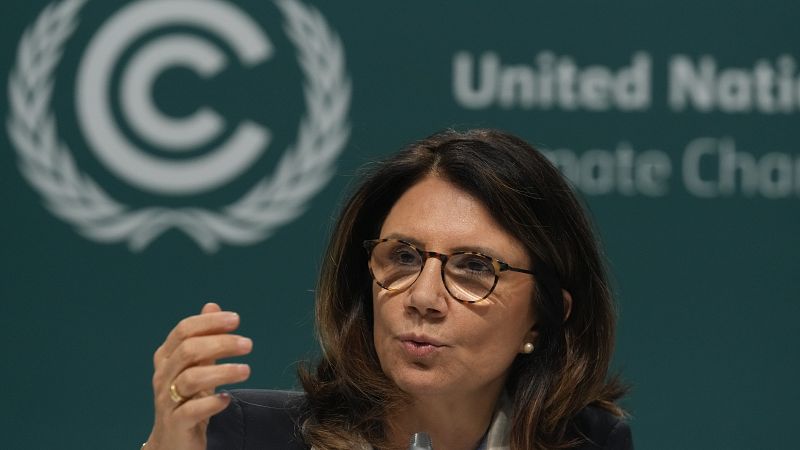COP 29: Brazil warns no deal unless rich countries raise climate finance target

Brazil has rejected the Azerbaijani presidency’s second attempt at a political deal on climate finance, while civil society groups staged an impromptu protest in Baku in solidarity with the developing world at the end of a day that saw negotiations go into extra time.
“Brazil's position is that we are really still hoping that we can get into an agreement here,” Brazil’s climate envoy and lead COP29 negotiator Ana Toni told Euronews late on Friday on the sidelines of the summit. “We are really disappointed that the numbers came so late and that we may not have enough time.”
She was referring to a revised proposal for a political compromise tabled by Azerbaijan at 3pm local time. It was the first of a flurry of negotiating texts since the talks began on 11 November that put a number on the ‘new collective quantified goal’ (NCQG) for climate finance from the rich to the developing world.
But the figure of $250bn a year from 2035 was immediately rejected by climate activists and a swathe of civil society groups as inadequate for the test of helping developing countries avoid fossil fuels dependency.
“We feel if those numbers have come in the beginning, if this tax had come in the beginning, we are absolutely sure that we could have an agreement and unfortunately came very late and we don't know anymore,” Toni said, shortly after Brazil’s environment minister Marina Silva delivered a similar message to reporters in the COP29 complex.
The issue is particularly pressing for the largest country in Latin America, which as host of the COP30 summit next year was hoping to move onto discussions on implementing updated emissions reductions pledges from almost 200 parties to the Paris Agreement to halt limit global heating to 1.5°C above preindustrial levels.
Now the country faces the prospect of having to pick up the thorny issue of finance, while a lack of certainty over future financial flows will make it more difficult for developing countries to draft their so-called nationally determined contributions (NDCs) to the global emissions reduction effort, which are due by February.
“It’s not a problem just for Brazil,” Toni said. “It is for every country that is here, and obviously for the population that suffers first – that’s what we are concerned about.”
“The money that’s being discussed here is not for developing countries, it’s for the sake of all of us,” Brazil’s climate chief continued. “Because if we are able to achieve our ambitions and see who is going to benefit, it’s not just Brazilians, it’s everybody.”
It’s no use just Europe or the US taking climate action – all countries must undergo the same transition or “none of us will be safe”, she said.
The Brazilian official spoke of a “historical responsibility wealthy western nations have towards the developing world, and while acknowledging that finally having a figure to negotiate around was a step forward, although she pointed to a lack of clarity around where the money would come from, be it the public or the private sector.
“These improvements should have happened ten days ago,” she said. “But we will do everything possible because we want to get out of here with an agreement.”
Asked whether should thought a deal could be struck on Saturday, Toni’s reply was brief. “Who knows?” she said.
Silent protest
Journalists were already starting to leave the complex towards 10pm – after receiving word that a third draft of the COP29 deal would not emerge until the morning – when a group of several dozen protesters began to file past in a silent and unannounced march through the corridor, watched closely by security personnel.
The amount of money on table was “peanuts” and made a mockery of the Paris agreement, said Kirtana Chandrasekaran of Friends of the Earth international when the group came to a halt. The civil society protest was in solidarity with the G77 countries, she said, urging them to “stay strong” and reject the current NCQG text.
“It's not grant based money, which is something that the developing countries have been asking for from the beginning,” Chandrasekaran said, arguing that the formula on the table would burden developing countries with more debt.
“It's completely unacceptable and it allows the developed countries a complete exit from their obligations to provide climate finance for developing countries,” she said.
At the time of publication, talks were ongoing behind closed doors to produce a final draft of NCQG agreement and other key texts. National delegations were due to discuss what could be the last compromise proposal at a plenary session at 10am local time on Saturday (23 November).
Yesterday

